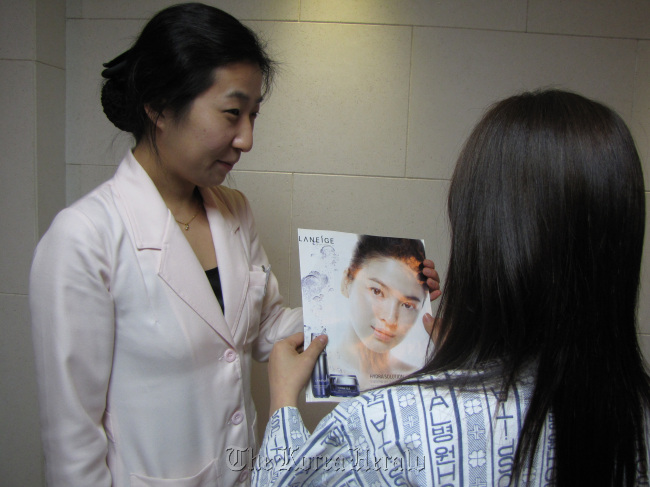Nose jobs and double-eyelid surgery are so common even among teens in Korea that they are no longer considered surgery, but mere cosmetic treatments.
The overall number of Koreans who receive plastic surgery is striking.
When the entire population is taken into account, Korea has the highest rate of anaplasty in the world, according to the International Society of Aesthetic Plastic Surgery, an international group of plastic surgeons.
Korea topped the ISAPS list with 16 per 1,000 people going under the knife in 2010, followed by Greece, at 14 per 1,000, and Italy and Brazil, both 13.
A 2009 survey by Trend Monitor, a market research firm, suggested that one in five women in Seoul have gone under the knife.
People’s opinions on plastic surgery have also changed.
People have become more positive toward medical procedures to become prettier.
“We live in a time when appearances are one’s competitiveness. I cannot defy the trend,” said Kim, a woman in her 40s wishing to be indentified only by her surname.
“I have a daughter who is in third grade. I do not mind her having cosmetic surgery. But I wish the time would come later in her 20s when her personality and self-esteem are fully developed.”
Experts say beauty equates socio-economic power as it is an important factor for men when choosing their spouse.
“Plastic surgery has become a means to gain the ‘competitive edge’ over others, just as a pretty hairdo, expensive-brand clothes and make-up,” said Kim Jae-hwi, a psychology professor at Chung-Ang University.
Children these days are very interested in beauty. Some grade-school students as young as second grade carry a bag of cosmetics such as lip gloss, a manicure set and other make-up.
“A classmate of my eight-year-old son even proudly told him that her mom would let her have double-eyelid surgery,” said Choi Mi-na, 40, who was with her son in Gwanghwamun, central Seoul.
“I am not against plastic surgery itself, but what I am worried about the most is, what if they lose their own uniqueness? I’ve had Asian blepharoplasty (double-eyelid surgery) myself, but I regretted it some years later realizing I had lost my uniqueness.”
Middle- and high-school students say at least one or two, or even more, of their classmates have undergone cosmetic surgery.
“My teacher at school recommends us to go under the knife, and many classmates think of having it,” said Park So-hyun, who goes to an arts middle school in Seoul.
“She points out specifically where she thinks the students need improvement in their appearances. Since the students major in dance, how they look is considered quite a bit more important than other factors,” Park said.
“The media often misleads people’s minds and thoughts by presenting distorted views on beauty. Today, a person’s appearance is considered more important than personality and ability,” said Lee Dong-geun, a freshman majoring in piano at Seoul Arts School.
The results of surgery may not be as expected or disappointing, surgeons warn, if people recklessly have cosmetic surgery just to resemble celebrities.
One 18-year-old high-school student suffered years of pain after she had eye enlargement surgery in 2009. The procedure entailed having the outside corners of her eyes slit and cost 1.8 million won ($1,600), three times more expensive than a simple double-eyelid surgery.
The surgery, however, left scars on her eyes. She went through another surgery to clear the scars, but it was unsuccessful. She is now seeking restitution from the doctor.
Experts say that mental and psychological maturity should be first considered before surgery, and teenagers should think twice and get professional consultation before going under the knife.
“Since teenagers’ self esteem is not yet fully developed, they are often unsatisfied with their looks. So even after surgery they might not be happy with the results. It is better to have it later,” said Oh Kang-seob, a psychology professor at Sungkyunkwan University.
“Since children are still growing, surgical procedures including cutting bones such as orthognathic surgery or corrective jaw surgery are avoided except for functional purposes,” Na said.
By Kim Young-won (
wone0102@heraldcorp.com)








